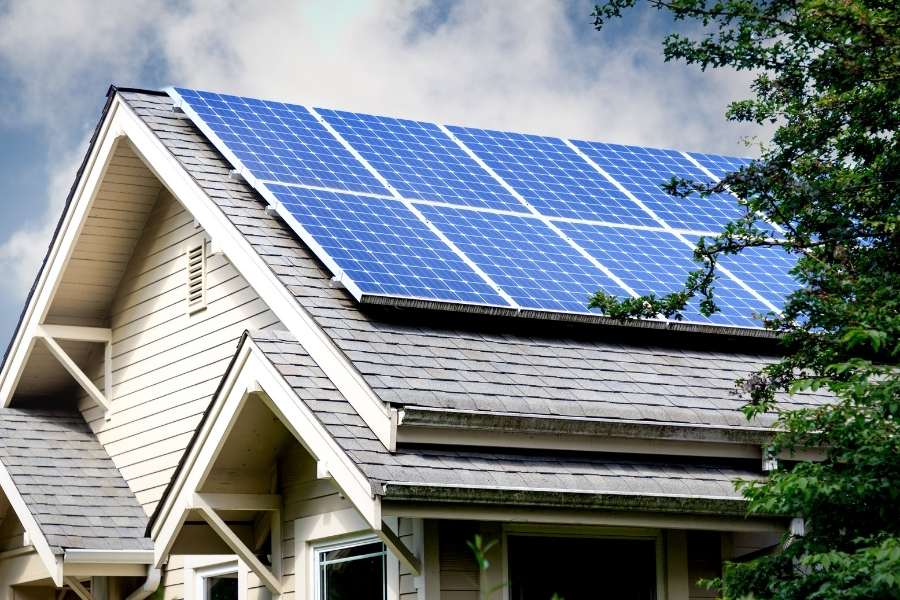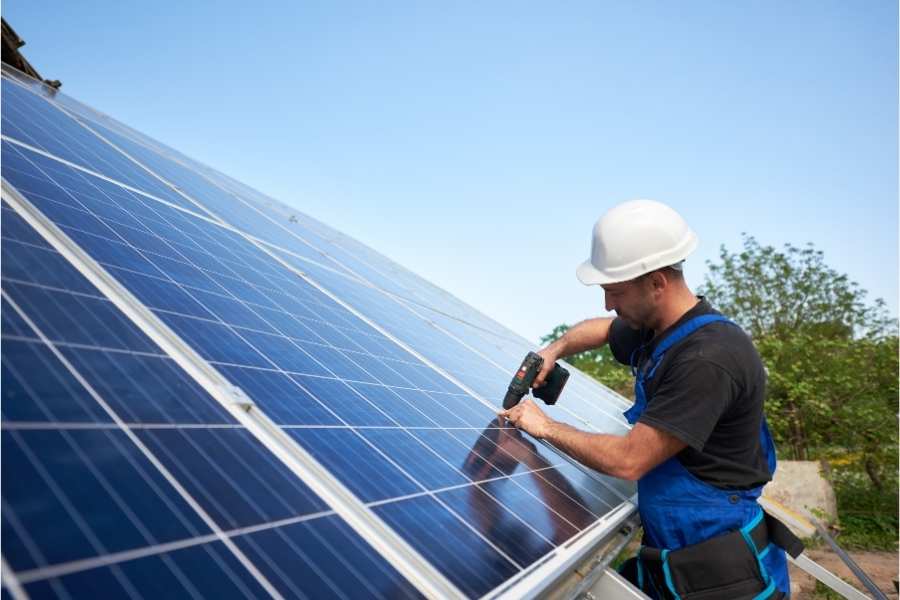Installing solar panels gives you a feeling of accomplishment that is unparalleled. You get the satisfaction of installation and of saving money. Find out how.
Solar energy has emerged as one of the most reliable sources of renewable energy. The traditional sources of energy such as fossil fuels now face a number of challenges including growing environmental concerns and rising prices.
Installing solar panels is an environmentally friendly way to become energy-independent and protect yourself against fluctuating energy prices. Solar Energy Systems is the top solar panel company in Florida that you can trust
To find out how to achieve these benefits and more, ch.check out this guide.
Do the Math
Proper planning is key to solar panel installation. Why do you want to convert to using solar energy? Will the change help you save money? The amount spends on electricity depends on how much electricity your household consumes and the rates set by your utility. After the change, how much power is your solar system able to generate? You need to do this entire math.
In your state, is the electricity sold by the local utility cost-competitive with solar energy? The cost of the switch is dropping in all parts of the World and this trend is likely to continue. It’s not only the prices of the panel that is dropping but also installations costs.
Crunching the numbers helps you to plan your finance. The aim of the switch is to help you save money, but you will still be needed to make an investment at the start. As you plan, always take into consideration the size of the plan and its quality. Make sure they match your finance. Where do you want your panels placed, and when? Make sure you have all these figured out.
Is all the planning causing you sleepless nights? As you plan out your solar panel installation job, feel free to check out our solutions to better slumber.
Can Your Roof Support Solar Panels
Is your roof in good shape structurally? Does it need renovations? If your roof needs renovation, take care of that before the panels are taken up. This way, you will avoid paying extra money to disconnect the system during renovation and pay again to connect.
Is your roof covered in shade most of the day? Such a roof lacks “solar window” to justify solar costs. This is something you need to evaluate before moving forward. If your roof isn’t structurally fit, or you can’t make the call since you live in a multi-unit building or you rent your apartment, step back and plan afresh.
Also, consider your yard. Your roof might be unobstructed now but if the leafy oaks in your yard may block your panels in future.

Credit: Canva
Will You Be On-Grid Or Off-Grid?
Before you install the solar system, will you be on grid or off the grid? First, what’s the difference between on the grid and off-grid system? An on-grid system is linked to a larger utility or grid that is shared among the neighborhood. While an off-grid system is not hooked up to any utility or grid. This system is great for persons who live away from the utility that connects energy. It’s common in ranches and rural homes.
You should decide if you should be on grid or off the grid before making any investment. This is a decision that should be given a priority. If you live in a rural area, Los Angeles solar is ready to hook you up with an off-grid plan. However, for a residential area, on grid plan is better.
What Size and Type of Solar Panel Will Meet Your Needs?
It’s very important to find out the size of the solar panel that will create enough solar energy for your home. The size of solar will be determined by the amount of energy your home needs. If your house is small in size, you will be fine with a few solar panels. However, it’s still possible to live in a smaller house and use a lot of energy.
There are two main kinds of solar technologies you can install. The first one is photovoltaic and the other one is thermal. Photovoltaic uses arrangements of cells to change sunlight into electricity while thermal uses sunlight for air conditioning or energy for heating. If you use a lot of energy for air conditioning or heating, a solar thermal investment is best for you.
To Lease or Buy?
You need to run a cost-benefit analysis to decide if you will lease or buy the solar power system. If you decide to buy, be prepared to spend a lot of money upfront. However, once purchased, you will not have to worry anymore about monthly payments.
If you decide to lease, you will have to pay a monthly bill to the company that owns the system and once the lease is up, they take their systems away. In many cases, no money is needed upfront when leasing the solar energy system. The set monthly payments to the owner of the system are calculated based on the estimated amount of power produced by the system.
Using a solar PPA, consumers agree to buy the power generated by the leased system at a fixed price per kilowatt-hour of energy produced.
As you weigh the options, remember the panels can function for years. However, there are components of the solar system that have a shorter lifespan. You need to factor in replacements of these components as you do the lease or buy cost-benefit analysis. Take time to weigh the options and make sure you compare the total life-cycle cost.
Can You Get Financing for the Switch?
There are different financial options available for people who decide to switch. If you decide to purchase your solar power system, there are solar loans that can help you make the purchase possible. In addition, most states and the federal government offer a solar tax credit program. This will help you save money.
How does a solar loan work? These loans function similarly to home improvement loans. Some states offer subsidized solar power loans with below-normal interest rates to encourage their citizens to switch to solar energy.
If you’re a new homeowner, you can add a solar energy system as part of your mortgage. There are some mortgage plans that will allow you to include funding for home improvements in the property’s purchase price.
Once you buy a solar power system, you become eligible for the 30 % tax credit on your system is known as Solar Investment Tax Credit. If you choose to lease, you will not be eligible for tax benefits associated with the switch to solar energy since you don’t own a solar energy system.
Have You Signed the Solar Contract?
After signing the solar contract, be it a cash purchase, loan or a lease, an engineer will visit your property to assess the electrical needs of your home and ensure everything will support the solar energy system. The engineer visit will occur immediately after you sign the contract.
What are the key things that the engineer evaluates? First, is your roof structurally fit to support the panels? Does your electrical panel need an upgrade? If the engineer recommends a panel upgrade just know that the new system has more ampere capacity than your box can handle.
Note that engineer visit is different from installer visit. The installer visit comes before the engineer visit and its purpose is to establish the shading, angle of the roof, system size, etc. before you sign any contract.
Permits and Documents
There is a lot of paperwork involved in solar panel installation but the installer handles most of it. Some of the key paperwork you’ll be handling by yourself includes renewable energy certificates, government rebates, clean energy financing initiatives, and local and federal solar incentives among others.
In addition to applying to finance initiatives, you’ll also need to handle other paperwork such as building permits. The building permits are specific to your neighbourhood.
For instance, some states require homeowners to leave at least three feet clear space around the solar panels while some states have no problem with homeowners who install panels across the whole surface of their roof. Your installer will also advise you on restrictions and requirements of your state.
Ordering the Panels
Now that you have taken care of all the paperwork, your installer is ready to fix the panels and inverters. If you aren’t sure about the brand you want, ask your installer to recommend for you.
What are the parameters used to compare brands? Other than the price, homeowners consider aesthetics, efficiency, and durability when comparing brands. Do your own research before asking for advice.
Once the ordering process is complete, the installer will add your property to their queue. The panels and inverters are likely to arrive on the installation day. This will be after your paperwork is approved.
The Actual Installation
This is, of course, the most anticipated day for you. The installer will start by ensuring your roof structure is fit to support the solar energy system. Then, proceed to electrical wiring. After wiring, they will install racking to your roof that will hold the panels. The inverters are used to convert direct current (DC) into the alternating current (AC).
The installation period will last from one to three days, depending on the system you’re installing. Consider going for a budget-friendly family vacation during this time.
After installation make sure that your solar panels are running at maximum capacity and your panels don’t become a magnet for pigeons to nest.
Approval and Interconnection
This is the final step of the installation. Before you link your solar energy system to the electric grid, you must seek approval from your local government. A representative will conduct an inspection to make sure your installer’s work is up to standard.
Once the local government inspector “gives the okay,” your system is ready for official grid interconnection. You may have to wait for 14 days, give or take for utility approval to happen and interconnection to go live.

Credit: Canva
Installing Solar Panels During the Wintertime Can Land You A Better Deal
Summer is the busiest period of the year for solar energy system installers. Most homeowners avoid installing solar panels in the winter since they think that the panels don’t make energy during these months. Fact is your solar panels can make electricity throughout the year.
During the wintertime, some installers may opt to offer seasonal deals to attract new customers. You’re likely to get friendly quotes from different installers if you go out shopping in winter.
Planning to shop for a solar panel system installer online? Check out our blog post on how to save money while shopping for products and services online.















